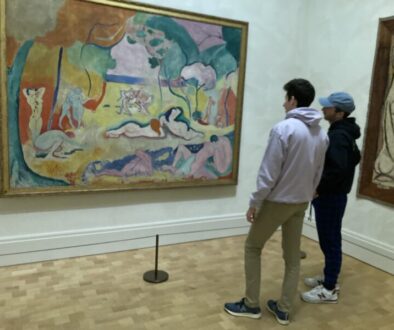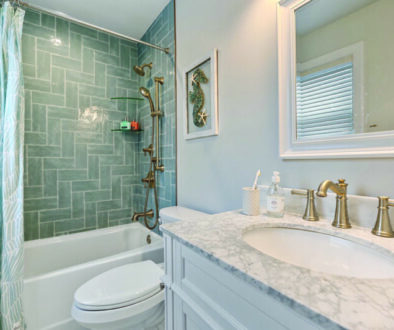The Islander: Patrick Logue

It’s not surprising that Cape May would be home to one of the most respected hospitality consultants on the east coast. During the 1990s and early 2000s, Patrick Logue, a young University of Delaware graduate who had worked for Hilton Hotels, was a key player in one of New Jersey’s biggest renovation success stories. He worked with Curtis Bashaw on reopening Congress Hall, Cape Resorts’ flagship hotel, a monumental feat that became a gold standard for historic preservation and excellence in hospitality. Patrick remained at the helm, guiding Cape Resorts through numerous ventures in Cape May and beyond.
After nearly three decades of accomplishments at Cape Resorts, Patrick is lending his vision and experience to a new partnership with Lawrence Green and entrepreneur Jack Wright. Their venture, Ferry Park, operates several eating and entertainment establishments at the Cape May Lewes Ferry in North Cape May.
Seated in the beautiful second-floor restaurant, The Lookout, a light-filled space overlooking the Delaware Bay and miles of nature reserves across the canal, Patrick reflected on his career and shared advice for entrepreneurs and those with hospitality industry aspirations.
When did you first come to Cape May?
My first summer here was in 1984 at Congress Hall at the prompting of a college friend. After college and working for Hilton for a number of years, I ran into Curtis in Cape May after the Virginia Hotel had opened. I came back and began working for him in 1992. I worked for them for 28 years, until 2020.
Then you joined Jack and Lawrence in this venture?
Not immediately—within the course of a year.
Did the pandemic have anything to do with leaving Cape Resorts?
No, it was a natural break. I thought, if not now when will I make a change? It seemed like the right time. My second family was the Cape Resorts family and Curtis, so it was a very difficult choice to make.
Whose idea was it to make this ferry terminal a destination for fine dining and summer concerts?
The imagining of this whole project was Jack Wright’s. He was approached by the Delaware River and Bay Authority as one of seven groups to pitch their vision for taking over food and beverage operations here. He reached out to me and Lawrence Green for assistance. I was doing independent consulting at that point with a few hospitality groups. I kept my ties with Cape Resorts and helped in recruiting some of their recent hires.
What does your current role as Director of Operations of Ferry Park entail?
Day to day, I make sure all employees understand what expectations are and that those expectations are met as to our service delivery. This project has been incredibly hands-on. I’ve gotten to do some things like the landscaping around the patios in the summer. You become a jack of all trades. There aren’t always other people to do it. My natural abilities adapted into all sorts of things that I had never had my hands into. I love coming in early in the morning in the summer and watering all the potted plants. It’s been very rewarding.
Is being a jack of all trades due in part to the current difficulty in finding hired help?
For sure! I’ve bussed a lot of tables over the past two years. I started off years ago as a busboy, so it comes full circle. But as an operator, you must have standards. I would rather limit the number of people we’re seating and make sure they’re properly served than to overload a dining room that is underserved. One thing that I cannot abide by is walking by a dirty table. If I walk into a dining room and sense mayhem, the first thing I will do is start bussing tables that nobody wants to look at.
Atmosphere is truly important in hospitality.
Yes, it’s all part of the magic that we’re supposed to make, which is seamless from the guests’ perspective. What’s so enjoyable about hospitality is that an effective manager needs to make sure the public has no idea of the hard work, like a fine production.
Was that a key element in your Cape Resorts role?
I’m very proud of the role I played, and the role Cape Resorts played in telling the story of Cape May. We’ve left an indelible mark on the hospitality of Cape May and in the Hamptons, which I’m so proud of. It was under the vision of Curtis, who was a great mentor and to whom I’m very grateful.
What was your biggest contribution to this current partnership?
To some degree all three of us love to imaginate — that means sitting in meetings and imagining, together, what these spaces could look like. This is a beautiful building with unsurpassed views. It just needed to be loved and warmed up. We all had different ideas of what that would be. My own contribution was part of the design and how to utilize spaces. For instance, six months of the year it’s very windy and cold here so fireplaces are a huge draw for people. But to answer your question as to what I brought — my strengths are in sales and marketing, so I focus on how these restaurants can be used. I’ve always thought with that hotel side of my brain on how to fill beds. Well, here it’s how to fill seats or concerts.
As a hospitality consultant, do you ever visit a restaurant or hotel and suggest to the management how things could be better?
I’m not as forward as that. I’m an observer to the point that I drive my partner, friends, and family crazy at times. It’s impossible for hospitality people to sit in a dining room or stay in a hotel and not observe what’s going right and what’s not going right.
When you visit friends and family at home, are they intimidated being the host to a hospitality consultant?
There can be a little of that because people perceive you as the persona of the places you represent. I grew up in an Irish family and growing up for me was welcoming family to our home from Ireland or New York and looking after them. Without realizing it, I was providing hospitality when I was a kid because of our Irishness. We’re generally predisposed to welcoming people in a very genuine way. In an Irish home there is an amazing sense of welcome.
Can you talk a bit more about early influences?
My father worked for Triangle Publications, a Walter Annenberg company, for over 30 years in downtown Philadelphia. I think my love for hotels and beautiful spaces and imagining what can be came from my dad taking me to business meetings. They were held in the ballroom of the Bellevue Stratford Hotel on Broad Street. As a little boy I’d hold my dad’s hand as I came off the train, stopping at Wanamaker’s to see the toy display and the Crystal Tea Room and then going to a meeting with him. I’d sit in the balcony of the Bellevue Stratford Hotel and watch the cigar smoke waft up while these guys had their meeting. The place looked like a palace to me—very Versailles-like with crystal chandeliers, very opulent. I didn’t realize the effect it had on me until years later.
What would be a general rule for those in hospitality to follow?
A general rule would be not to overshoot what your capabilities will allow. In restaurants and hotels when they attempt to be more than their abilities, it ends up being somewhat of a mess.
Where is the line between elegance and pretentiousness?
The line is whether it feels natural or not. If it feels forced or is somehow out of context, that’s where you run the gamut of what is authentic and what isn’t. For instance, at Cape Resorts our goal was simple pleasures executed very well. The last thing you want is guests who leave and feel that something was not authentic. Hospitality depends on how you greet guests and care for them while they are here.
How do you find balance in your personal life?
Stress is a constant battle for me. Getting outside is how I find balance. I love being outside. On my deathbed, please get me outside and under a tree.
Where is your favorite outdoor spot in Cape May?
The beach between the cove and the lighthouse is where I go. That’s my thinking beach. That walk is long enough to give you time to unwind and get out of your head. If I do that walk, I’m good. I also have a love affair with Wilmington, Delaware, and the Brandywine Valley. I’m a cheerleader for Cape May and the Brandywine Valley. My heart is in both places.
Is there any singular moment in your hospitality career that stands as your most rewarding?
Yes, getting Congress Hall open in 2002. We’d been tested for so long and there was so much contention around the project. Having the governor there to cut the ribbon and open the building was monumental. That remains a great source of pride for me. The second would have to be managing the Chelsea Hotel in Atlantic City for four-and-a-half years—incredibly challenging and insanely tough, as the credit market crashed as we opened it. Great positioning of a product at the worst possible time. It ultimately failed, but through the failure I learned more about business and what I was capable of than I could have ever imagined.
I hear you saying that failure gave you a fearlessness about facing challenges.
It certainly helped a lot, and it gave me a sense of mission. I felt very dedicated to the employees. I feel satisfied that we did all we could and still maintained a standard of excellence.
What is the solitary force a hopeful entrepreneur needs to succeed?
Intestinal fortitude. And that comes from a true entrepreneurial spirit. For instance, Curtis Bashaw has a true entrepreneurial spirit. It’s not easily replicated. There are not many in this world of that ilk and when you find someone in this world with that fire in the pit of their belly, you know they will be successful because you know they’ll figure it out. I was on a panel once that MAC did called “So You Want to Be an Innkeeper?” My job was to convince them that, “No, you don’t.” (laughing) But we all had fun and were able to talk about all the glitter and wanderlust that people have of thinking they will just be baking muffins in the kitchen and not realizing it will be at 3:30am before they shovel the sidewalk. We did our best. (laughing) But I honestly think the program was very reality-based. I offered myself to many people as a resource if they decided to really pursue that life.
Is entrepreneurship an art?
There’s a great deal of crossover between artists and entrepreneurs. Both can be viewed as people who are mad in a creative way. There tends to be an on-the-edge-ness with them.
There’s a trend on TV shows where a celebrity cook or hospitality consultant goes to a restaurant or hotel and tries to improve things with harsh criticism or drastic remodeling. Do such shows mislead people as to how a business succeeds?
The key to successful business is to stand the test of time. When I watch those shows, I always wonder if it’s lasting and sustainable. If we use a Gordon Ramsey episode as a model, I want to know what happens six months or six years after he leaves. Much of those shows are instant gratification — ‘it looked like this before and here it is now!’ Only the greatest institutions can stand the test of time, and that comes down to consistency.
Do you have any dream destinations you want to check off your list?
My dream is to summer in Bar Harbor and winter in Palm Springs, but that’s not going to happen any time soon.
You said that with a smile on your face, so it tells me you are happy where you are. Thank you for agreeing to step into a well-deserved spotlight for this interview.
I don’t naturally seek the spotlight. I’m not an entrepreneur. I don’t want to be that guy; I’m not made of that stuff. I’m happy to be the guy to execute the vision and be the guy behind the visionary. I like being off stage until the key guy needs a hand. Nobody likes a backseat driver until the backseat driver yells, “Watch out!” and prevents a tractor-trailer from hitting you head-on.
It’s not my intention to be a disruptor; rather I see myself as a consensus builder. I feel that open and healthy disagreement, via discourse among team members, leads to a more thoughtful and balanced business plan. ■



